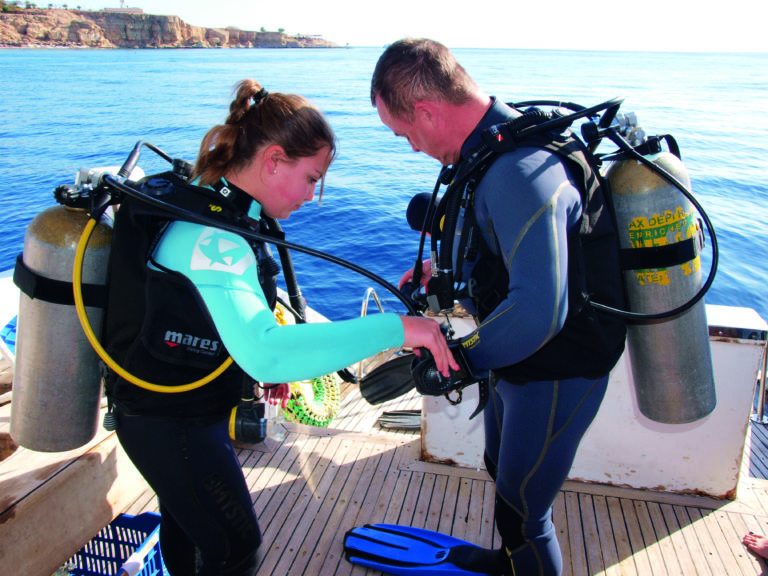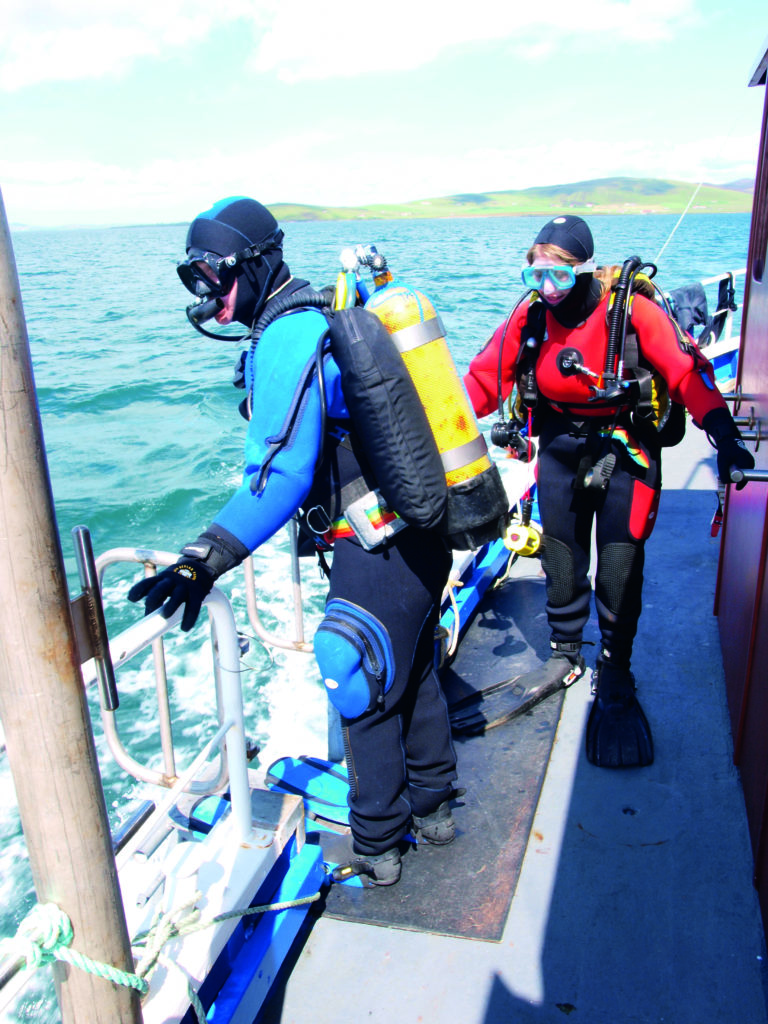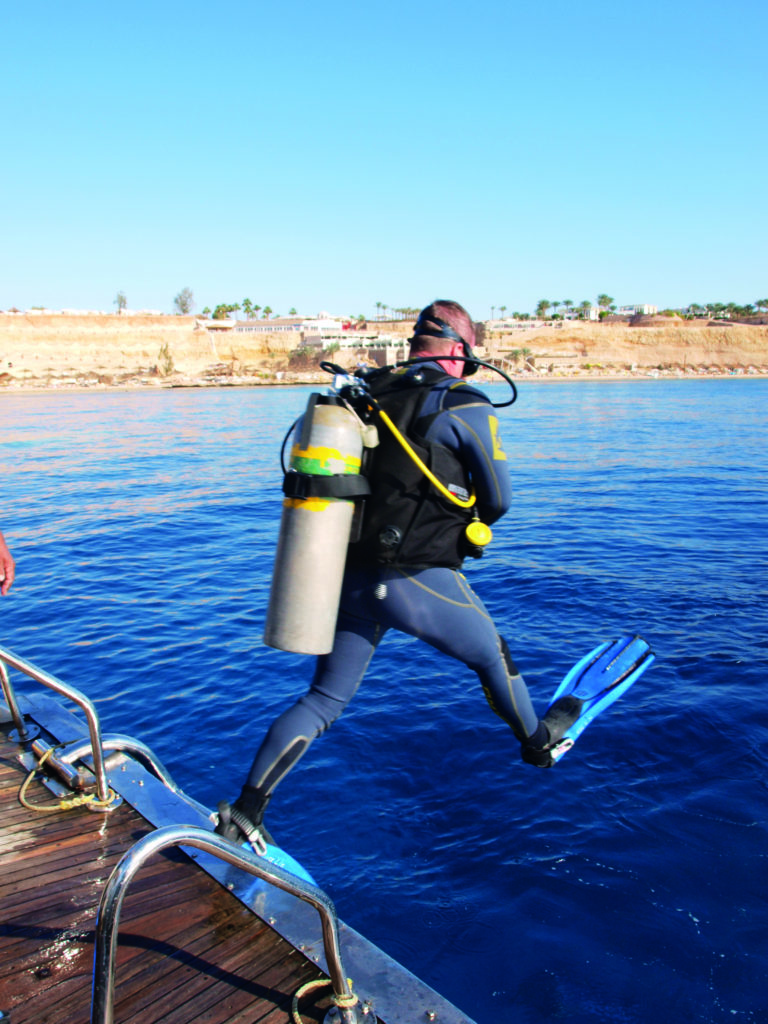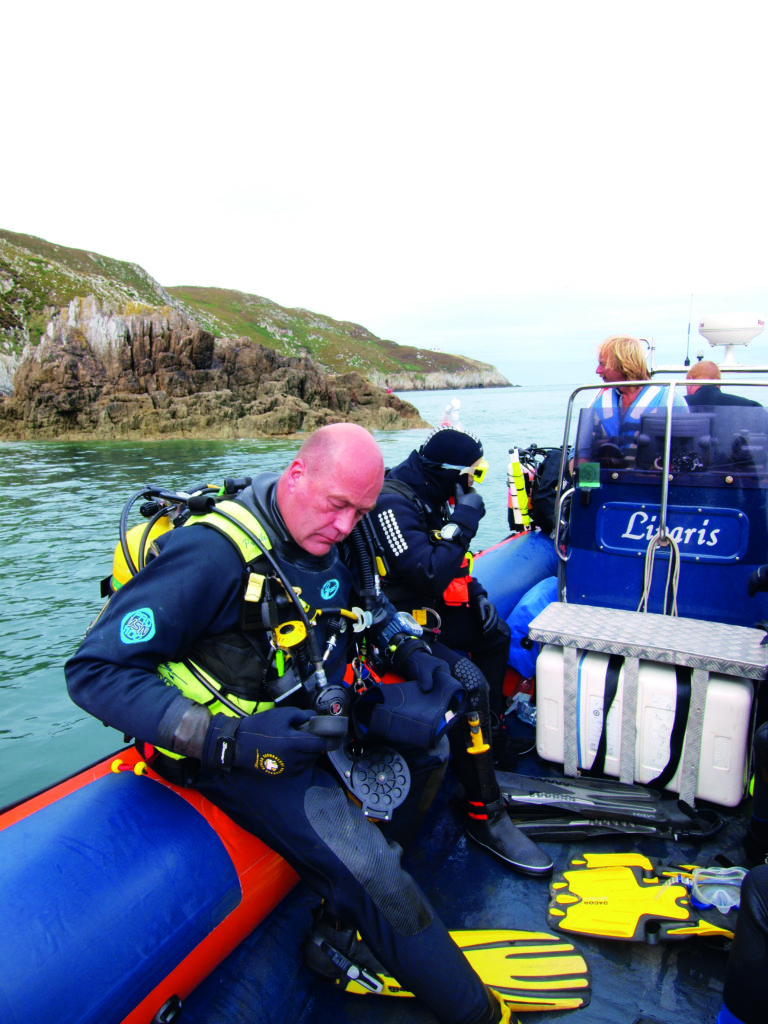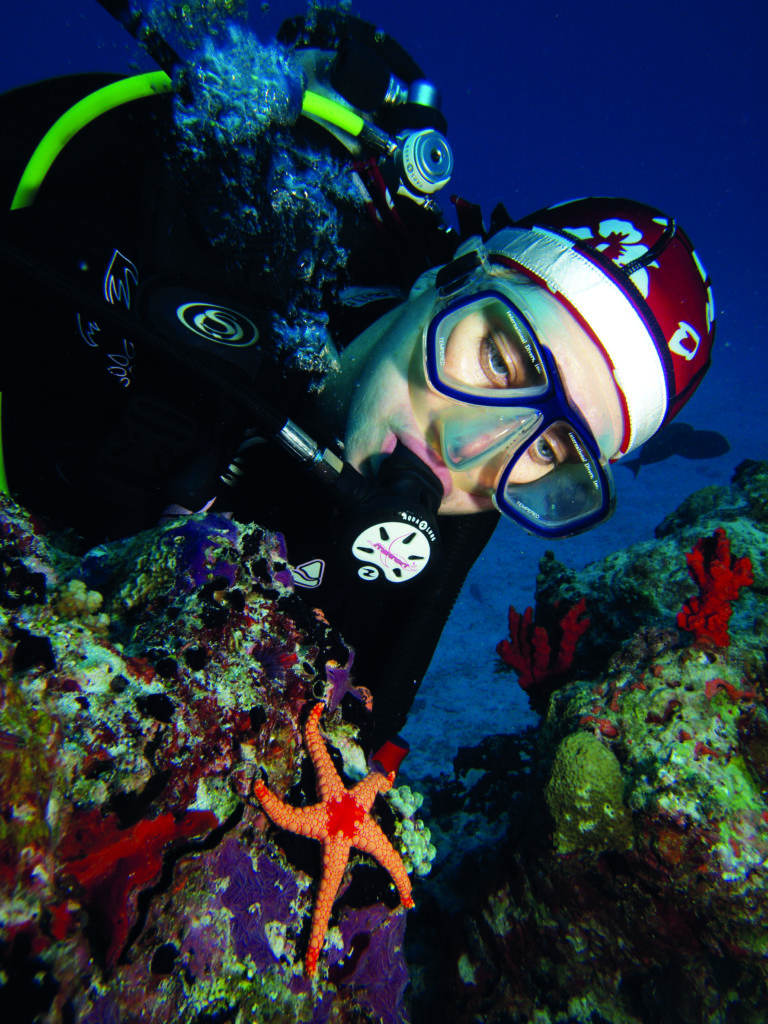Everyone should feel free to pull out of diving at any point, as our panel of experts agree
GUE’s John Kendall: “It's often said that ‘Any diver can call a dive, at any time, for any reason’, but human nature means that it can be quite hard to do this.
“We all know that there are limited opportunities and time to go diving, and by the time you've driven to the coast, paid for a hotel, a boat, a gas-fill and you know that your buddy has done the same, then there is a high internal drive not to call a dive, and to just put up with it.
“My philosophy on this has been developed over thousands of dives, and it is quite simple – I’d much rather be sat on the boat wishing that I was diving than to be underwater wishing I was back on the boat.
“There are some quite obvious reasons to call a dive early – any kind of non-fixable equipment failure for one. I also have a personal rule of no more than three fixable issues. By this, I mean that if I have had to fix three things prior to a dive, then I stop, pull out of the dive and go to fix everything properly.
“But what is much harder to decide is to call the dive when it just doesn't feel right. I often find that divers will just go with the flow and do the dive regardless, because they think it's weak to either not dive, or to thumb the dive early.
“I am exactly the opposite. If I don't feel 100% comfortable with a dive, or a dive-plan, then I will just simply call the dive. I have called dives because I’m not communicating well with my dive-team, as I could tell that both they and I were getting frustrated, and so it was better to stop the dive, ascend and then debrief to fix the problems before the next dive.
“When I look at incident reports, and especially the fatalities, I often look at what happened (on the few occasions that it's known) and most of the time the problems that led to the incident generally started in advance of the dive.
“A lot of the time, it seems to me that had the divers been honest with themselves and their team about their own capabilities or comfort, then many of those incidents could have been avoided. However, unfortunately, ego doesn't seem to allow us to admit to our own worries and failings.”
BSAC National Diving Officer Dai Atkins: “So much effort goes into getting yourself ready for a dive, it sometimes feels as ifh there’s no reason on Earth why you shouldn’t go through with it.
“Acquiring and preparing your kit beforehand and checking it over, planning the logistics of getting to the site, arranging buddies (as well as baby-sitters, pet-sitters and getting someone else to finish decorating the spare room!), undertaking rigorous training at great expense – yet the pinnacle of all of this precision-planned organisation could be no more than half an hour accrued in your logbook, so you want to make sure it happens at all costs – right?
“Well, not always – there are some days when it’s best to cut your losses and plan for the next one.
“Equipment failures happen. In the same way, risk of wind is increased for consumers of gassy drinks, it’s an eventual inevitability for regular divers that some piece of kit will break, and this usually happens when you least want it to. But as well as planning for these eventualities, you must follow your decision tree and stick to your actions as planned to maintain your safety record (and that of others around you).
In the field of redundancy, Two is One and One is None – when you have two of something you have resilience if one fails, when you have one of something and it fails, you’re left with diddly-squat. So there’s a valid reason you have a back-up, and when you find yourself using it, it’s time to get out of the water before diddly gets you.
“Often it’s clear from the start that a dive isn’t going to end well, so the decision not to start it in the first place is a sound one.
“Weather systems can change, and while jumping off a boat into a big splash is as easy as 3.14159265259, don’t forget to give due consideration to getting back onboard in thick swells with clunky crushing lifting-mechanisms grinding near your pinkies and swiping near your head, and spinny whisk things glinting at your fleshy parts as you look wide-eyed at your trusted friend who just received his qualification to drive the RIB…
“Despite feeling all calm and zen under water, diving is still a strenuous sport – and your body burns calories like they’re going out of fashion just counteracting the physical pressures of the surrounding environment in order to continue providing your cells with energy and oxygen to function.
“This level of exertion can be affected by many other factors – illness, medication, tiredness, injury, general under-the-weatherness (or that ever-so-slight morning after the night before feeling) – and these are all valid reasons to give the next dive a miss and sit in the wheelhouse or harbourside café, drinking tea and watching the penguin show.
“Finally, as a responsible buddy and possibly even the most responsible of them all, the dive manager, it might fall to you to keep an eye on your fellow-divers to check that they’re comfortable to carry out their dive too, or have a problem that needs resolving.
“If that resolution is to bin the dive, so be it. You can still do it with diplomacy, empathy and strength of conviction. And it is much easier to plan the next dive if you have managed the survive the previous one through sensible decision-making!”
Emily Petley-Jones, PADI Courses Examiner & Regional Training Consultant: “Before leaving home, I will have a quick check that I have my keys, wallet and phone. It’s fair to assume that most people will do a similar thing. If one of these three things is missing, I don’t leave the house until I’ve found it. I adopt a similar check when I go diving, and if one aspect is out of place, I will abort the dive.
“It’s important to check personal kit is in place as well as that of the other divers – that everything is in working order and has a current service, there are spares, there is plenty of air in the cylinders, and all emergency kit is functioning.
“It’s important to consider the dive-site, conditions, entry and exits, communications, your buddy’s fitness and certification, and run a risk-assessment. You should not only consider your own ability to rescue your buddy, but their ability to rescue you. If there is any doubt over kit, diver ability and the conditions, it is time to abort.”
Vikki Batten, PADI Certification Examiner, Course Director & TecRec IT: “You should always call a dive before you reach breaking point. Leaving it too late can mean that your head is no longer in the dive, and your response when a problem occurs is no longer optimal and may even be poor.
“The trick is recognising when you are no longer comfortable enough to apply your normal level of awareness and skill. For me that means asking: ‘Do I want to be here?’ If the answer is ‘no’, it’s time to abort the dive and head home. My rule is to make sure that if I did die on that dive, my last thought wouldn’t be ‘I knew I shouldn’t have done that!’
Garry Dallas, Training Director for RAID UK & Malta: “From a subjective point of view, few people enjoy diving more than me. In 20 years of diving and thousands of dives, I have actually called a dive only twice. However in hindsight, and in all honesty, I should have called hundreds of dives.
“So why didn’t I call those dives? Well, for plenty of reasons, which some of your readers could relate to. While inexperience can sometimes cloud one’s judgment, being too goal-focused while attempting to not let the team down can be a poor decision on reflection.
“Obvious reasons have played their part, such as feeling dehydrated or tired before a dive; having muscle fatigue or an injury; being the dive leader or organiser; not wanting to miss out on anything; surrendering a deposit; slight issues with equipment; peer pressure from others in the group; spurious mindset – these are all reasons why maybe I should have called a dive.
“Less obvious reasons during a dive could include an initial feeling of losing control or developing anxiety; dramatic environmental changes; or task-loading above the limits of the mind, equipment or training.
“In my experience, the more-adventurous person is less likely to call a dive. Abundant amounts of testosterone running wild through one’s veins can often shadow the ‘domino effect of calamity’ about to take place. It’s time to take a step back and review decision-making.
“Human factors and the normalisation of deviance can also play a part in the way we competently and repetitively go about our daily dives. The reason I vary my diving so much is that it makes me think and rethink about procedure and assess my own awareness before, during and after dives.
“Remember, be unaf-RAID to call a dive for any reason at any time.”
IANTD’s Tim Clements: “IANTD has always emphasised the individual right of divers to turn a dive, from the outset of its technical diving programmes over 30 years ago. The phrase ‘better to be on the boat wishing you were at 50m, than at 50m wishing you were on the boat’ has been a key part of that training.
“How do we identify situations when that might be needed, or divers feel uncertain about the dive? The first group of situations covers scenarios when good dive practice has not been implemented from the start.
“No gas-plan? Turn the dive at the surface. Poor team-matching, ill personnel, ego issues, lack of preparation, rubbish gear, lack of brief for route and navigation, or lack of clear procedures for rescue – all these should turn a dive at the surface until sorted out.
“‘What’s the worst that could happen?’ is a common, jesty phrase at the moment, for situations immediately pre-dive when something is not right, usually to allow the dive to proceed anyway. This attitude will get someone hurt and should be an immediate sign that preparations are not sufficient.
“All the preparation might have been carried out for water conditions that don’t match the dive-plan. Vis might be poorer, currents stronger, the shot not as intended, equipment leaking – all of these are alarm bells indicating that Plan A is no longer valid.
“If we have a good Plan B and everyone understands that this is now the plan, perhaps the dive can proceed, but this is the point at which individuals will have differing feelings about this.
“However, no one should feel compelled to continue a dive if they are not happy. If this in-water update is carried out at the bottom of the shot, this allows a safe dive turn at this point. To force team-members to swim away from the ascent-line in marginal or unplanned conditions risks mental discomfort and panic.
“There could be many reasons why we don’t feel a dive is suitable for us. It could be environmental, it could be physical condition, it could be the onset of poor gas or performance anxiety. The list is long. Your brain possibly also recognises more about a situation that you process – the small voice of intuition in your head that won’t stop, even though you can’t identify the exact problem, is probably right.
“The core message is that if you’re concerned about a dive, communicate with your buddies for reassurance. Check yourself, check your team, and check the plan. If this doesn’t work, indicate that you wish to turn the dive – a distracted and worried diver is not a strong team-member. If your buddies don’t respect this, get new buddies.
“To assist with all of this, make sure that you feel confident with your own gas-management and ascent skills. If you’re not relying on someone else, you will be a stronger and more confident buddy and turn fewer dives.
“Ask your club, instructor or regular buddies for some skills sessions to address which bits don’t work for you, and you’ll be a safer, happier diver.”
Photographs by Mark Evans
Also on Divernet: Connecting On The Dive, Dealing With Surge & Swells, How To Stay In Shape, RIB Diving, Communicating Under Water
